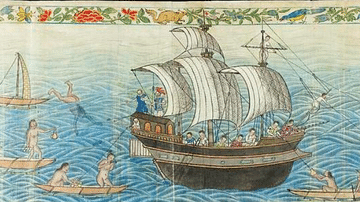Search Definitions
Browse Content (p. 79)

Definition
Spanish Galleon
The Spanish galleon (Spanish: galeón, nao, or navío) was a particularly large type of galleon used for both carrying cargo and as a warship armed with up to 60 cannons. Used from the mid-16th century until the early 19th century, Spanish...

Definition
Grace O'Malley
Grace O'Malley (l. c. 1530-1603) was an Irish chieftain and seafarer who became famous as a pirate and rebel during the reign of Queen Elizabeth I of England (1558-1603) who was trying to increase her control of Irish lands. O'Malley's exploits...

Definition
Manila Galleon
The Manila galleons were Spanish treasure ships which transported precious goods like silk, spices, and porcelain from Manila in the Philippines to Acapulco, Mexico, between 1565 and 1815. The Atlantic treasure fleets then shipped some of...

Definition
Gutians
The Gutians were a West Asiatic people who are thought to have lived around the Zagros Mountains in a region referred to as Gutium. They had no written language and all that is known of them comes from their enemies, including the Akkadians...

Definition
Code of Ur-Nammu
The Code of Ur-Nammu (c. 2100-2050 BCE) is the oldest extant law code in the world. It was written by the Sumerian king Ur-Nammu (r. 2047-2030 BCE) or his son Shulgi of Ur (r. 2029-1982 BCE) centuries before the famous Code of Hammurabi was...

Definition
Henry Morgan
Sir Henry Morgan (c. 1635-1688) was a Welsh privateer who operated in the Caribbean against the Spanish Empire and then became Lieutenant Governor of Jamaica. Morgan was a charismatic and able military leader who masterminded devastating...

Definition
François L'Olonais
François L'Olonais (also spelt L'Olonnais or L'Ollonais, c. 1630-1668), real name Jean-David Nau, was a French buccaneer and pirate who operated from Tortuga on Hispaniola. In 1667, he famously attacked Venezuela, then part of the Spanish...

Definition
Buccaneer
The buccaneers were privateers who attacked enemies of their state, namely Spain, in the Caribbean and on the American coast (the Spanish Main) throughout the 17th century. Initially hunters and then seamen and soldiers, the buccaneers successfully...

Definition
Serapis
Serapis is a Graeco-Egyptian god of the Ptolemaic Period (323-30 BCE) of Egypt developed by the monarch Ptolemy I Soter (r. 305-282 BCE) as part of his vision to unite his Egyptian and Greek subjects. Serapis’ cult later spread throughout...

Definition
Melusine
Melusine (pronounced Mel-ew-seen, also given as Melusina) is a legendary figure from European folklore depicted as a mermaid, sometimes with two tails, as a serpent from the waist down, or as a dragon. She is associated with the ruling houses...